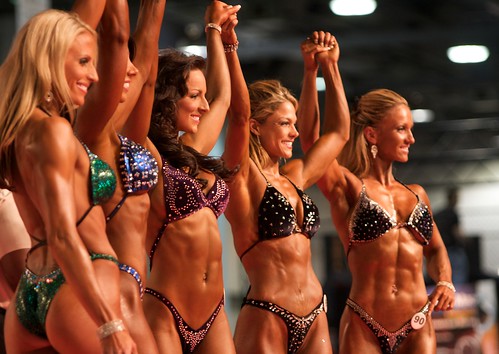But would you enjoy funny sexist advertising? Would you giggle at the dress sense of women actors? Would you read celebrity or fashion magazines? Pay for so-called beauty products or treatments? Put up with odd gender stereotyping from partners/bosses/colleagues? The answer to some of these, and a lot of other things is probably yes, at least some of the time.
Does it make you feel guilty? Suzanne Riesman at BlogHer wrote about women wanting to "hand in the feminist badges" for enjoying the superbowl ads. Over at Feministing they have a number of unfeminist guilty pleasures, including rap and reggaeton music, blogs, tv shows, control undies and such.
Everyone has something they just can't help but love, regardless of her otherwise intact feminist-cred.
Here's my top 5 health and fitness related unfeminist guilty pleasures:
5. Mid-rift baring workout tops - They're not that practical, they don't stop boob-bounce, and I'm sure they scream "object" rather than "subject". I only wear them under my real workout singlet to the gym, but I totally hang around the house in them checking myself out, sucking in my belly, and thinking that maybe, I'll wear just my bright pink lycra crop top to the gym one day, and stun the world with my amazing abs (see number 1). Yeah.
4. Pussycat dolls/beyonce/shakira-esque dance - Girating, grinding, shimmying, hip-wiggling and the occasional squat with a hair flick. It bugs me when it gets played in gyms on the tvs. You can't change the channel, and it cant be doing anyone any good in a bodylove sense. I hate it there. Sexual public display embodies women's power? Yeah, I don't buy that crap. But get me out of the public eye, and I'm all about it. I love a good boogie, and it can be fun to flip your hair around in shocking man-pleasing fashion from time to time, I'm even considering joining a class called "Diva Moves" eek.

the Pussycat Dolls: embodying women's strength and power? I don't think so.
3. Reggeaton music - this one I share with some of the women at Feministing. Reggaeton music is basically latin rap/r'n'b/hip hop (i'm not exactly down with the lingo). I love the beat, I love the melodies, and i love to get sweaty to them in the gym. With my limited knowledge of spanish, I'll be in the dark unless they start talking about direction to the train station or ordering coffees. But if these music videos are anything to go by, my guess is its just gangster rap in a different language.
2. Fitness magazines (and judging the competitors) - These magazines are like crack to me. I love them. I cherish them. I can't always afford them. The articles are usually at least feminist-neutral. They aren't exactly advocating being yourself, but they do promote strong, capable women role models. But the ads! Blonde, busty, bikini-clad women telling me I'm too fat, page after page. And then there's the competition pages, you know for fitness and figure comps. I know its a sport, i know that its hard, involves training and skill. But i just can't get over the outfits, the nails, the tans and the forced smiles. Chances are, if you are a woman participant in one of these competitions, I have judged you.

yeah, they're buff, but spangles? Really?
1. The continuing quest for a mainstream-attractive body (or parts thereof) - the last and worst of my unfeminist foibles. Most of the time I work out for me. I like the feeling, I like getting stronger and more co-ordinated, I like knowing I can run for the bus if i need to, and carry all my groceries home without the car. But sometimes, everynow and then, I ache for a 'firm butt' or 'tight abs', or less 'jiggle'. It might not hurt anyone else, but this definitley gives me the feminist guilts, and it annoys me that I would spend time, effort and energy on trying to change my physical appearance when I could be changing the world.
* yeah, i know he's a little bit nicer sounding now, claiming he wouldn't force his opinions, but thats only cos he thinks he's in with a chance. Check out this interview for more recent Abbott moralising. Even the title makes me cringe.
Let me know what your unfeminist fitness secrets are...

